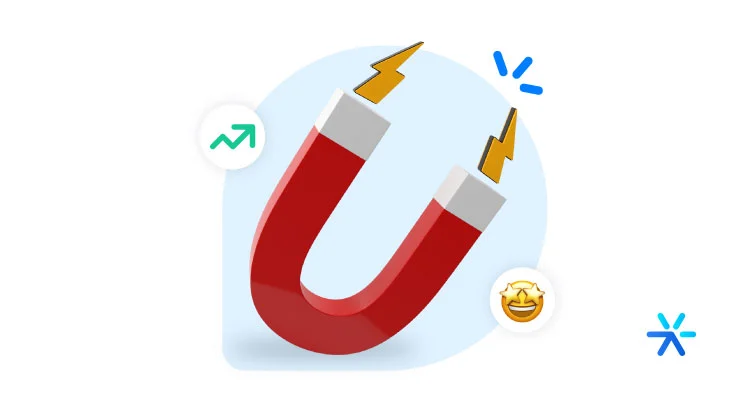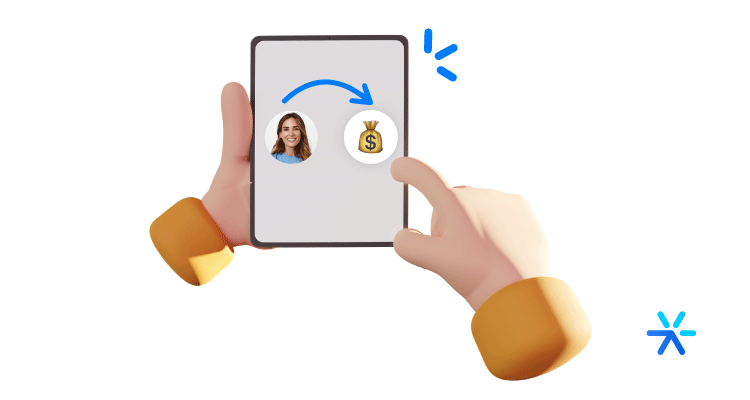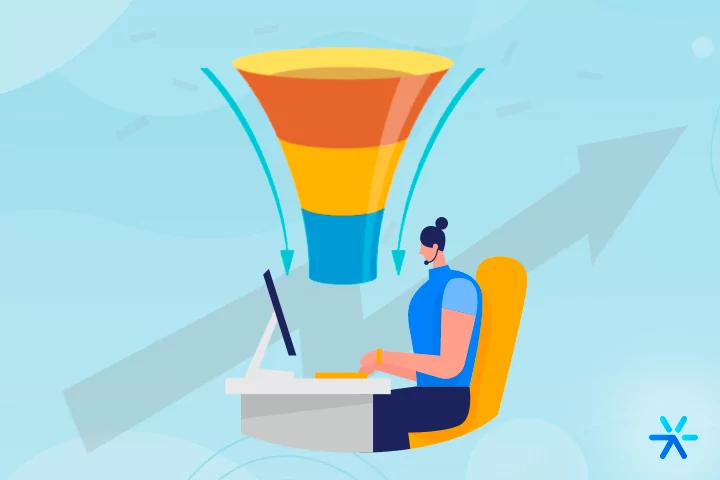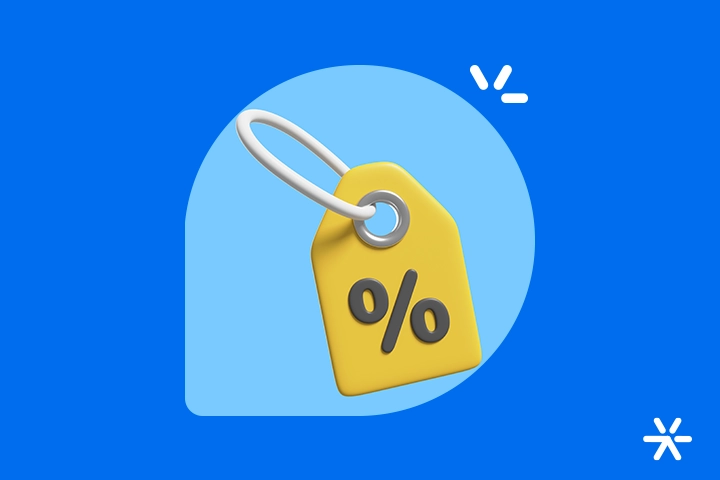How the Pre-Sales Area Can Improve Your Results
Reducing wait times in customer service, understanding lead profiles, and qualifying leads before passing them to the sales team to improve conversion rates—this is the goal of a pre-sales strategy.
Check out the complete article to understand how this strategy works, its benefits for different business models, and how to structure a team to put it into practice.
What is Pre-sales?

As the name suggests, pre-sales is a stage in the sales funnel that occurs before the actual sale.
It acts as a filter to focus efforts in the right places.
The pre-sales team is responsible for making the initial contact with leads from marketing and qualifying them.
During this stage, it’s possible to better understand each lead’s profile, interests, and potential for purchasing.
What is the Difference Between Pre-sales and Sales?
The difference between sales and pre-sales, although both are part of a company’s commercial area and require an integrated process, lies in the division of functions.
The pre-sales team focuses on prospecting and qualifying leads so that the sales team can focus on negotiating and closing contracts, purchases, and agreements.
Pre-sales Responsibilities

With the task of preparing leads for the sales department, pre-sales focuses on three main areas:
Qualifying the Lead
After passing through the marketing funnel, the lead becomes an MQL (Marketing Qualified Lead).
At this point, the pre-sales team works to qualify this contact as an SQL (Sales Qualified Lead).
This process uses a strategic approach and questions that help identify if the lead is ready for a sales approach.
Identifying Pain Points
Through the initial contact and questions asked, it’s also possible to understand the lead’s pain points and needs, thus identifying the best solution for them among the options offered by the company.
All this information is recorded and passed on to the salesperson, who will have more insights to make the approach strategically, increasing the chances of a sale.
Read also: Spin Selling: How to Apply the Methodology to Boost Sales
Generating Market Intelligence
Beyond individual analysis, pre-sales also provides an overall market view.
With collected and recorded information, it becomes feasible to create detailed reports that support decisions regarding not only the sales process but also marketing and the product or service offered.
Advantages of a Pre-sales Department

If you’re unsure whether a pre-sales team would be strategic for your business, here are some advantages to help you decide:
Speeding up Sales
It may seem that adding an extra stage to the sales process would make it longer, but this is a misconception.
After all, the pre-sales department performs a function that would be necessary anyway, but it often ends up being handled by the sales team.
With the information provided by pre-sales, the salesperson can negotiate more accurately and efficiently, as the leads that reach them will genuinely be at the most opportune moment for engagement.
Learn more: 8 New Sales Channels to Test in 2022
Promoting Customer Satisfaction
The sales team often spends its time focused on ongoing negotiations and may not have time to contact a lead whose qualification is still uncertain.
With a pre-sales department, this problem is resolved, as it allows for quicker response times, which is also in the lead’s interest.
Generating Insights for Product Improvement
The contact between the pre-sales department and the lead happens when the prospect is highly focused on the solution they’re looking for and not necessarily on the brand.
This can generate valuable insights into what consumers are seeking in a particular product or service.
Sales objections raised at this contact point are also useful, as they help to understand what might prevent the lead from completing the purchase or make them turn to a competitor.
This supports the improvement of the solutions offered.
Enhancing Post-sales
The assessment conducted during the pre-sales phase is important not only for the sales process but also for post-sales.
By delivering qualified leads who are genuinely interested in the solution offered by the company, the chances of satisfaction after the deal closes are increased, improving metrics like churn, repeat purchases, and customer loyalty.
Types of Companies That Benefit from Pre-sales

Pre-sales is a valuable strategy for improving sales approach processes and results, but certain aspects of your business should be considered before implementing it:
Complexity
For simple transactions, an additional sales process step might not be necessary.
However, companies with more complex products or services can greatly benefit from a pre-sales team.
Which may offer free trials or samples of the product.
Lifetime Value
This metric is essential, especially for companies with recurring sales or services, as LTV reflects the client’s investment over the purchase/contract period.
If your LTV is high, investing in a pre-sales team is wise.

B2B or B2C
While pre-sales is common in B2B, it can also be useful for B2C, especially if marketing efforts generate a large number of MQLs.
Check out: 7 Best Digital Marketing Strategies for B2B Sales — and Other Insights
Inside Sales or Field Sales
Pre-sales works well for remote (Inside Sales) and in-person (Field Sales) processes.
For remote sales, the high number of leads benefits from the filtering effect of pre-sales.
For in-person sales, pre-sales ensures that sellers only approach qualified prospects.
Market Expansion
We’ve mentioned it before: pre-sales bring crucial information about the market.
That’s why it’s an excellent option for launching new products or solutions, as well as for companies looking to expand into other segments.
Pre-sales Team Structure

There are several formats for setting up a pre-sales team, and naturally, this will be determined by the structure and demand that your company has for this department.
To help you understand the ideal structure for your needs, here is a list of the professionals in this sector and their respective roles.
Pre-sales Analyst (LDR)
The pre-sales analyst, or Lead Development Representative (LDR), is the professional responsible for validating the information generated by marketing on each contact, as well as adding new data that will be relevant for the salesperson.
The LDR’s role is the first in the pre-sales sector.
Often, this work doesn’t even involve direct contact with the lead, instead focusing on research, data verification, and understanding whether leads are indeed decision-makers.
The contacts identified and enhanced by the LDR are then passed on to the SDR.
Pre-sales Representative (SDR)
A Sales Development Representative (SDR) or pre-sales specialist is a professional who works on prospecting and qualifying leads for sales through outreach, questions, sharing educational content, providing support, or even offering trials and samples.
In this way, they determine which leads are ready for a sales approach from a salesperson.
Business Development Representative (BDR)
The Business Development Representative (BDR) focuses their efforts on bringing new opportunities to the pre-sales team and, consequently, to the sales team.
The difference between the BDR and the SDR is that the latter works with passive prospecting, handling the leads generated, while the Business Development Representative engages in active prospecting, reaching out to the leads listed by the LDR.
How to Perform Pre-sales Efficiently

Consider Consumers’ Current Needs
The focus of pre-sales should be on consumer needs.
Only through targeted questions can you understand lead profiles, desires, and the best commercial approach.
Analyze Past Sales History
Having complete lead history helps understand what they’re interested in.
Analyzing past sales also reveals which consumer profiles choose each product type, investment amount, decision timing, and sales objections, supporting future sales negotiations.
Qualify Your Customer Base
After understanding the previous two points, it’s time to approach and qualify leads through pre-sales.
Use all the tips from this article to create the process that best fits your audience and company.
Offer Special Conditions
It’s a good idea to have some tools and strategies up your sleeve to capture the consumer’s attention during pre-sales and set up a follow-up contact directly from the sales team.
You can, for example, offer special conditions for better-qualified leads, free trials, product samples, giveaways, etc.
This piques the lead’s interest and opens the door for follow-up contact.
Use the Right Communication Channel
Understanding the lead’s profile is also crucial for defining which communication channels will be used, whether for active or passive prospecting.
There’s no point in having a great pre-sales approach if you can’t effectively reach out to the lead, right?
Conclusion
Did you enjoy the article on pre-sales?
Do you think this is a good strategy for your sales funnel?
You can also check out our free trial today! Use our chatbot for free for 14 days, no credit card required, and just watch how they do wonders to your pre-sales team.








